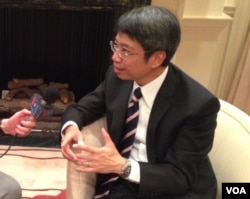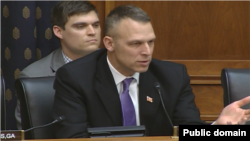A U.S. lawmaker is encouraging Hong Kong legislators to veto electoral rules proposed by Beijing.
In a recent interview with VOA, New Jersey Republican Representative Chris Smith said he supports a threat by Hong Kong pro-democracy lawmakers to block the Beijing-backed reforms, which would allow all voters in the autonomous Chinese territory to choose their chief executive for the first time in 2017, but only from a limited pool of candidates.
The 27 pro-democracy lawmakers in Hong Kong’s 70-seat Legislative Council, or Legco, have said the reforms do not give voters a “genuine” choice of leaders and have vowed to prevent the package from securing two-thirds Legco approval, a threshold required for it to become law.
Hong Kong’s No. 2 official, Carrie Lam, said last week that the city's election system could be reformed further, but only if Legco first allowed the current proposals to take effect for the 2017 chief executive race.
Smith encouraged the pro-democracy lawmakers to remain steadfast.
“The history of pro-democracy movements, whether in Eastern Europe or in Asia, has shown that you can't accept a bad deal in the hopes that someday a better deal will emerge," he said. "It’s not going to happen. The Hong Kong people have got to be very wary of that kind of offer."
Certifying autonomy
Smith said the bill that he authored last November and reintroduced in February is designed to help Hong Kong people get a “better deal” in terms of their electoral system.
The Hong Kong Human Rights and Democracy Act calls for the U.S. secretary of state to prove that Hong Kong is "sufficiently autonomous" from Beijing to deserve ongoing special ties to the United States, separate from U.S.-China relations as a whole.
Smith and other U.S. lawmakers see Beijing’s proposed restrictions on Hong Kong elections as a violation of its pledge to Britain to grant Hong Kong a high degree of autonomy after 1997.
Without annual U.S. reviews of that pledge, Smith said, Hong Kong's human rights will deteriorate in the same way as those of mainland China after the United States stopped annual reviews of Beijing's most-favored-nation trade status in 2001.
Clement Leung, Hong Kong's commissioner for economic and trade affairs in the United States, told VOA in January that he was lobbying against Smith's bill.
Leung said the Hong Kong government opposes annual certifications, seeing them as "more onerous" than existing U.S. law, under which the White House has to report to U.S. lawmakers only if it deems Hong Kong to have lost "sufficiently autonomous" status. The Washington-based envoy also said the congressional legislation would make Hong Kong "more vulnerable" to uncertainties in U.S. domestic politics and the U.S.-China relationship.
Smith denied that the bill would inject U.S. partisan politics into Hong Kong's relationship with the United States.
"This is not about the next [U.S.] election," he said. "I'm a human rights advocate, and I believe the bill is needed now more than ever to ensure that Hong Kong people have the greatest amount of democracy and freedom as possible. So we're going to keep pushing.”
Obstacles ahead
Smith's communications director, Jeff Sagnip, said the congressman is trying to recruit more House Republicans and Democrats to support the Hong Kong bill, which has attracted seven co-sponsors from both parties. Sagnip said Smith hopes the legislation will be referred to the full House Foreign Affairs Committee within the next few months.
If the committee were to approve the bill, it still would face major hurdles, including votes in the House and Senate and a presidential decision to approve or veto it.
In a sign of the challenge facing Smith, another House Republican, Pennsylvania Representative Scott Perry, told VOA in January that he would not necessarily support the legislation.
"It seems to punish Hong Kong with an annual certification of its autonomous status — a status over which it might not have much control," Perry said. "It seems that the more appropriate thing to do would be to attach requirements to any U.S. trade agreement with China to encourage it to stay out of Hong Kong's internal affairs."
But Smith insisted that his chances of ultimate success are good. "Like with any bill I propose, if it takes one year, or a year and a half, or 24 months, I will be at it until it is law," he said.






